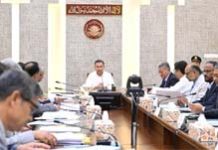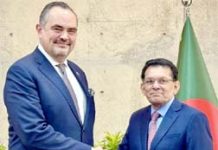C T Online Desk: While 29 per cent of the 2021 financial commitment remained unmet, international communities on Tuesday sought $881 million for the Joint Response Plan 2022 — mainly for meeting humanitarian and other needs of the Rohingya people of Myanmar living in Bangladesh.
Two UN bodies — the United Nations High Commissioner for Refugees and the International Organisation for Migration — took the lead in the Geneva-based donor conference held virtually.
Describing the Rohingya issue as a lingering crisis, State Minister for Foreign Affairs M Shahriar Alam, who joined the meeting virtually from Dhaka, said that Bangladesh should not be taken for granted to continue to bear the burden.
One of the priorities for Bangladesh is to maintain the temporariness of the stay of Rohingya people in Bangladesh, he said, adding that the UN must focus on ensuring return of the members of this community and reintegrate them in Myanmar.
International communities should invest more in Rakhine for creating there an environment conducive to the return of Rohingyas, he said.
Donor countries and organisations have left 29 per cent of the JRP 2021 commitment unfulfilled, said the state minister, as they made $674 million available out of the $943 million committed.
Myanmar is yet to demonstrate a genuine political will to take the displaced people back to Rakhine, he added.
UNHCR high commissioner Filippo Grandi said that the appeal for funds for the year 2022 was a sad reminder that the Rohingya crisis remained unresolved.
He claimed that the UNHCR and UNDP people were working on the ground to create a conducive environment in Rakhine so that the displaced people could go back home in the state.
Filippo Grandi and IOM director general Antonio Vitorino said that the world must not forget the Rohingya crisis with the emergence of other issues, like the Ukraine war, until making the repatriation of the members of the community to Rakhine possible.
Antonio Vitorino also emphasised the need for laying foundations for creating a conducive environment in Rakhine for starting the repatriation of Rohingya people.
The JRP 2022 is aimed at supporting some 14.6 lakh displaced people in the Rohingya camps and the host communities around the camps in Cox’s Bazar through 178 projects of 10 UN entities, 52 international and 74 local NGOs in 2022.
About 51 per cent of the JRP target population are women and girls while 49 per cent are men and boys.
The target population includes 9.18 lakh Rohingyas living in the Bangladesh camps. Of them, 4.82 lakhs are children under 18, 4.04 lakh adults between 18 and 59 and 32,870 older people above 59.
The target population also includes 5.4 lakh local Bangladesh people living in areas adjacent to the Rohingya camps.
Of the total $881 million sought, the UN entities asked for $209 million for food, $111 million for health services, $93 million for shelter, $87 million for water and sanitation services, $80 million for site management, $75 million for protection, $71 million for education and skills training etc. for the operation of the Rohingya camps in Cox’s Bazar.
The amount also includes $99.7 million for sheltering an estimated one lakh Rohingya people in Bhasan Char.
About 26,000 Rohingyas have so far been relocated to the island under a plan to take one lakh people there to decongest the camps in Cox’s Bazar, according to the Bangladesh government.
The fund would also include administrative and other costs of the fund users, according to UN officials.
The 51-page JRP 2022 document also includes plans for disaster risks mitigation and plantation in the camps.
Bangladesh has so far spent about $1.2 billion since the Rohingya influx began in August 2017, according to a government estimate.
UNFPA Bangladesh country representative Eiko Narita, Action Aid Bangladesh country director Farah Kabir and NGO Forum for Public Health country manager Urbi Chakma spoke respectively for the UN entities in Bangladesh, international NGOs and local NGOs engaged in Rohingya issues.
Farah Kabir emphasised investing more in women and girl members of the Rohingya community as they are relatively more vulnerable in the crisis.
US ambassador in Bangladesh Peter Haas and the representatives of the European Union, the UK, Japan, Australia, Canada, Thailand and New Zealand also made statements in the launch of the new JRP.
The JRP 2022 is the fifth such plan for the displaced Rohingyas from Myanmar living in Bangladesh.
After the latest Rohingya influx into Bangladesh due to unbridled murder, arson and rape during ‘security operations’ by the Myanmar military in Rakhine, what the United Nations has denounced as ethnic cleansing and genocide, beginning on August 25, 2017, the number of undocumented Myanmar nationals and registered refugees in Bangladesh has crossed 11 lakh, according to estimates by UN agencies and the Bangladesh foreign ministry.
Not a single Rohingya has returned home to Rakhine state since the signing of instruments between Bangladesh and Myanmar in this regard in late 2018.













